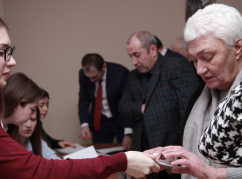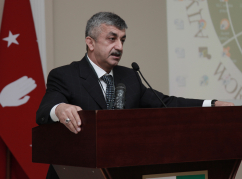The second meeting of the Seventh World abaza cCongress (WAC) was held in Sukhum on Thursday, March 22. The delegates of the forum approved the new edition of the Charter of the organization and formed its Supreme Council.
Asta Ardzinba
The VII Meeting of the World abaza congress (WAC) was held in Sukhum in two stages: the March meeting was a continuation of the meetings held on December 7-9, 2017.
The first part of the forum became historical. For the first time in 25 years of the existence of the public organization, a change in leadership has occurred. As a result, the permanent leader of the WAC, Doctor of Law Taras Shamba was succeeded by Mussa Ekzekov, a well-known philanthropist, scientist and businessman of Abazin origin. Inar Gitsba, former Plenipotentiary Representative of Abkhazia in Turkey and the head of the department of Turkey and the Middle East of the Ministry of Foreign Affairs of Abkhazia was appointed the Executive Secretary of the WAC.
The structure of the WAC also underwent changes: the Supreme Council of the organization and the Presidium were confirmed from among its members who will solve the current tasks of the WAC. In addition, in December the delegates adopted a draft of the new Charter of the organization, the need for finalizing of which, taking into account the suggestions and recommendations of all stakeholders, caused a break in the work of the congress. Delegates met again in March in the eve of the celebration of the 25th anniversary of the establishment of the State Committee for Repatriation of Abkhazia.
As noted in his welcoming speech, the Chairman of the Supreme Council of the WAC, Mussa Ekzekov, lawyers of the highest class were invited to work on the draft Charter.
"The project was sent out to representatives of the foreign Diaspora, who could familiarize with it and make their comments. All of them were taken into account. However, the document can be improved and supplemented in the future," said Ekzekov.
He also stressed that the Charter was drawn up in accordance with the laws of the Republic of Abkhazia.
According to Inar Gitsba, the Executive Secretary of the WAC, the main ideas and postulates of the Charter have been preserved, but the new document corresponds to new realities, reflects the new challenges that Abkhazians and Abazins face worldwide, moreover, it stipulates the use of modern technologies, including in the information field.
The head of the Moscow Abkhazian Diaspora, Beslan Agrba, in his speech expressed his readiness to support the new edition of the Charter of the WAC, noting that it reflected the idea of creating the necessary conditions for the return of compatriots to their historical homeland and their participation in the development of the state.
Agrba stressed that the main task of the whole Abkhaz-Abaza people is the preservation and development of the Abkhazian state, and all the forces of the Abkhaz and Abazins all over the world should be directed to this goal. At the same time, the head of the Moscow-based Abkhaz Diaspora is confident that the potential of the huge Abkhaz-Abaza Diaspora, which surpasses the population of Abkhazia in size, needs to be taken into account and used in the construction of the state.
The new version of the Charter of the WAC was adopted with an absolute majority of votes "for" and with nine "against". In total, the forum gathered 208 delegates from Abkhazia, Russia, Jordan and Turkey.
The welcoming speech to all participants of the congress was addressed by the adviser to the President of Abkhazia Raul Khadzhimba, Vladimir Zantaria who conveyed the words of support and good wishes to the Congress of the Abkhaz-Abaza people from the head of the republic.
The Chairman of the Federation of Abkhazian Cultural Centers in Turkey, Atanur Akusba in his speech detailed the problems of compatriots living abroad. In particular, he noted that many of them lose their native language, culture, and, as a consequence, national identity.
Akusba said that it is possible to call upon the people to return to their historical homeland, but it is important to understand that many people are connected with their countries of residence and are not ready to move, but in that case the Abkhaz state should not forget them and leave them alone with their problems. He cited the example of the Abkhazian villages in Turkey, which were assimilated, lost the thread with a historical homeland, a connection with history.
"We must help a person feel himself a part of the Abkhazian society, help them preserve their language, develop our traditional culture, they should not lose their identity, even if they are in Turkey or in any other country," Akusba said.
In his opinion, for the formation of the Abkhazian world, the cultural and historical idea of the international interstate and intercontinental community, united by its involvement in Abkhazia and adherence to the Abkhaz language and culture, it is necessary to consolidate all the forces of the people to preserve and develop the culture of the Abkhazians and Abazins, create conditions for the revival of the language.
On the agenda of the forum, besides the approval of the new version of the Charter of the WAC, there was also the question of the formation of the Supreme Council of the organization. Its members were representatives of the Abkhaz-Abaza people from Abkhazia, Karachay-Cherkessia, Kabardino-Balkaria and other regions of Russia, as well as from Turkey, Jordan, Syria and Adjara. Moreover, the Presidium of the organization was elected from among the members of the Supreme Council, which is called upon to address directly the current questions of the WAC in between the congresses.
In addition, the delegates of the Seventh Congress of the WAC presented a new large-scale project of the organization - the information portal of the WAC, which will, among other things, solve the problems of informing the Abkhaz-Abaza people, finding more about the history and culture of the Abkhazians and Abazins in various languages of the world.
The head of the portal Amina Lazba noted that the political isolation of Abkhazia is a direct consequence of the lack of reliable information about the country, about the life of its citizens inside and outside the republic, about the history and culture of the people. Therefore, there was a need to create a multimedia site that meets the requirements of the time and information challenges.
Delegates to the forum were presented with a presentation video of the portal; the website itself will be available in the coming months. At the moment, according to the project manager, materials of more than 10 GB have been collected, which will be translated into Abkhazian, Abazin, English, Arabic and Turkish. All content of the portal, according to Lazba, will be coordinated with scientists, historians, ethnographers and presented using the most up-to-date information multimedia technologies.


to login or register.